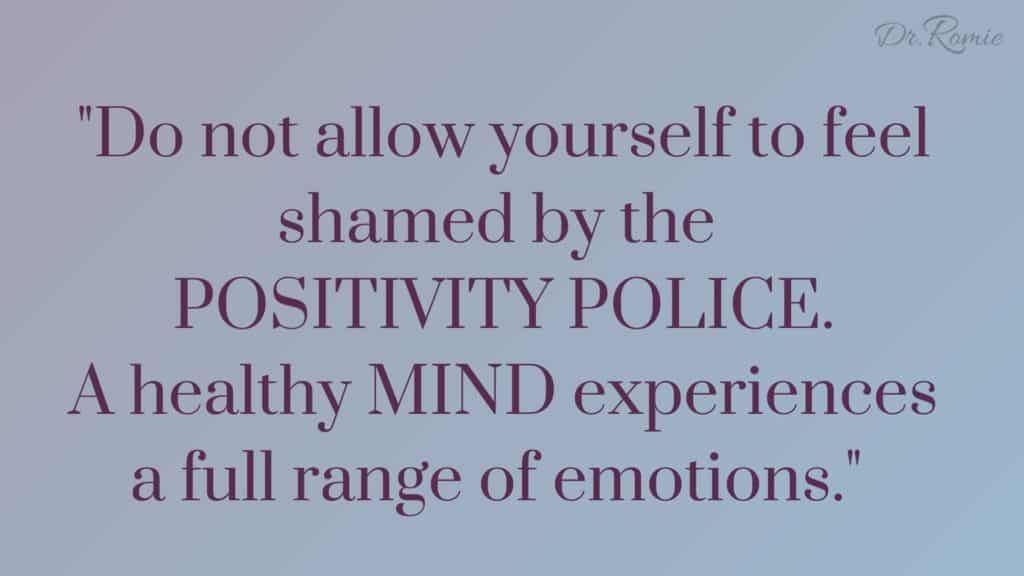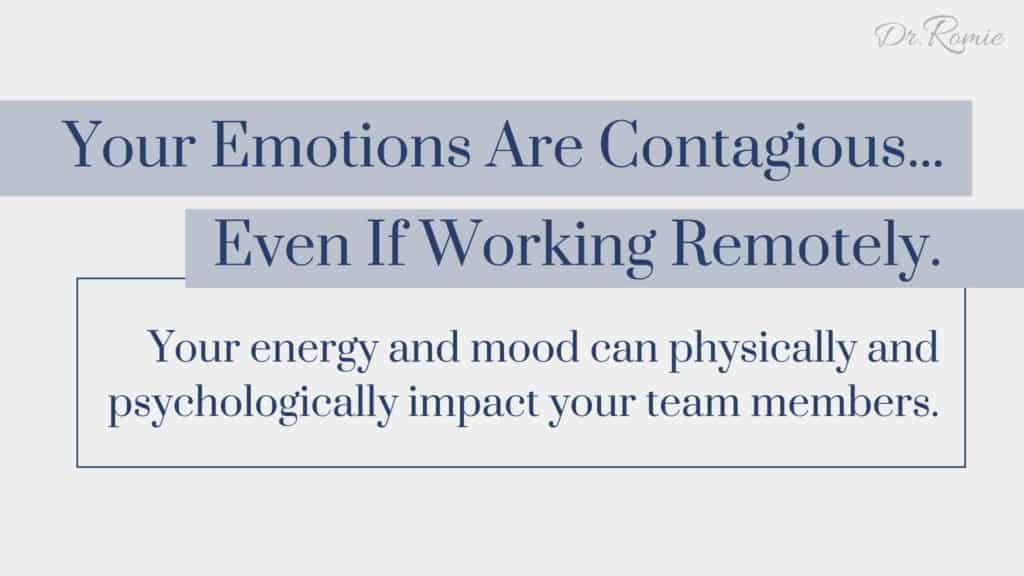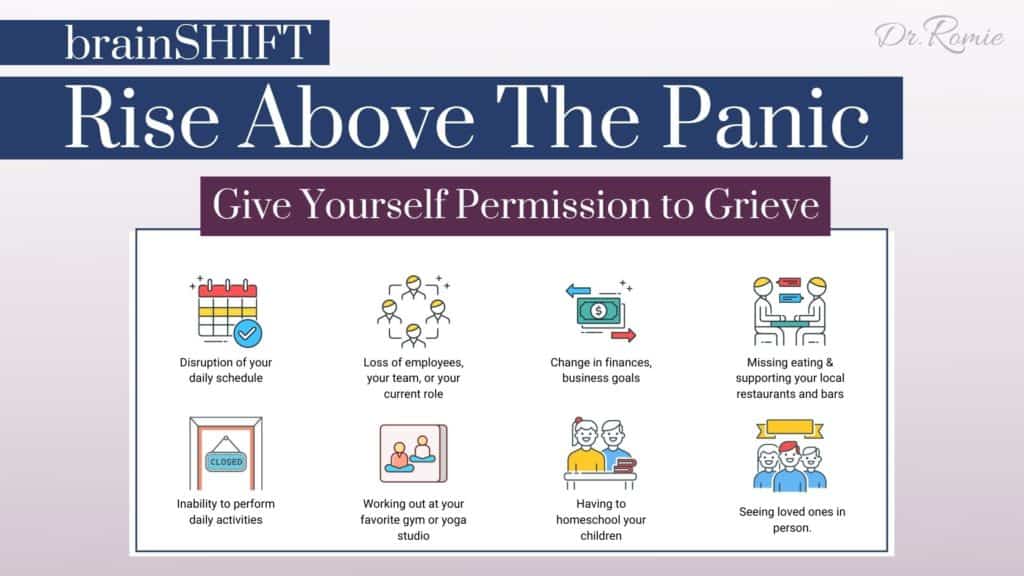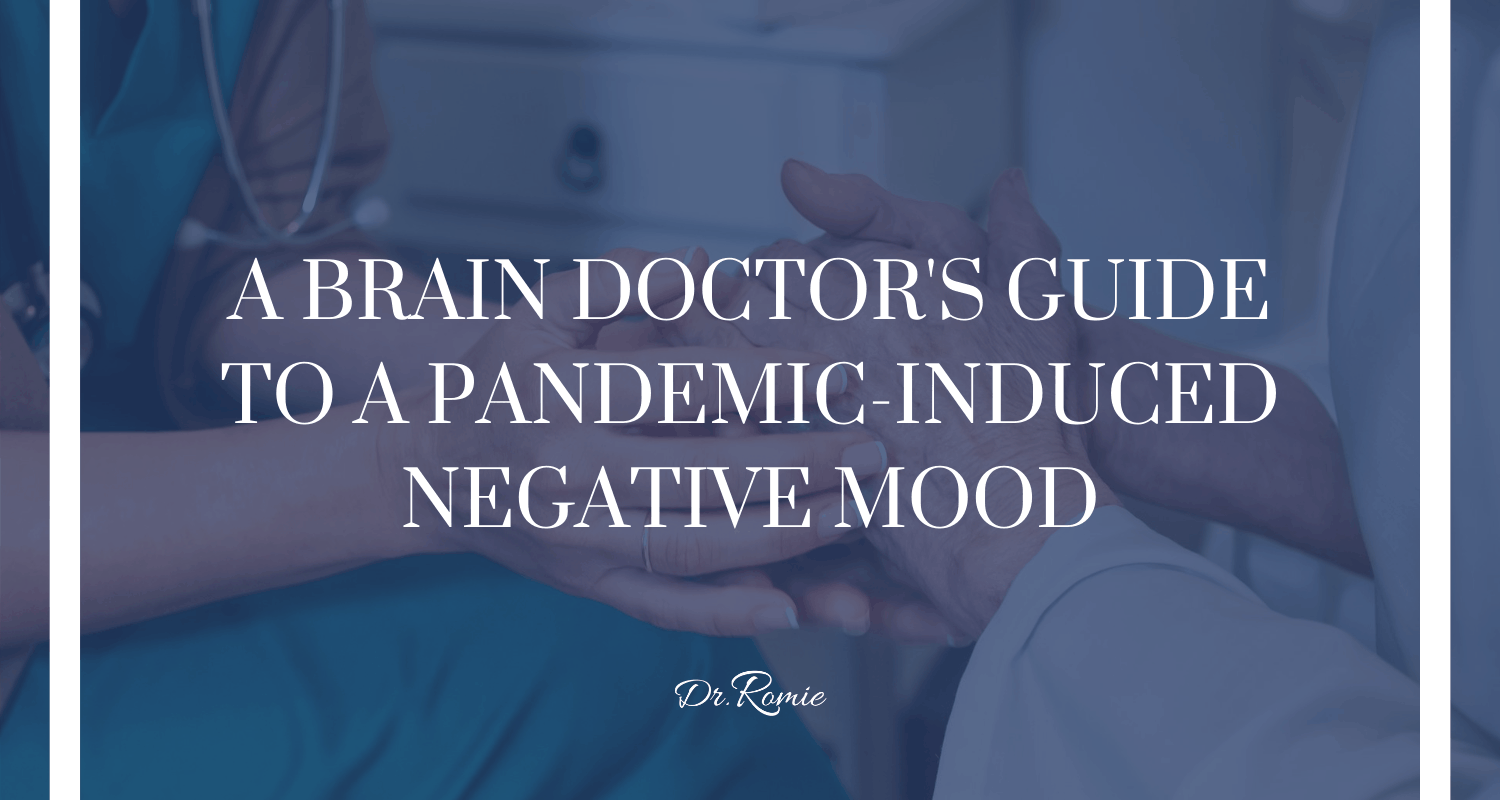Brain and mental health were largely ignored in the workplace BC (before COVID19), and the thought of addressing employee wellness was considered either a luxury or an afterthought in a conference. In the AC (After COVID19) world, thinking about the well-being of the workforce is essential for productivity and survival. My work as a workplace wellness expert used to center around training on stress-management, brain and mental health in the workplace, and mindful leadership. How do we shift and prioritize team members’ well-being as they work from home when we feel disconnected from one another?
Since the start of the Work From Home (WHF) era for some employees with essential workers on the front lines, we have presented over 50 virtual workshops training employees on “Rise Above the Panic.” What are the private conversations I was holding with leaders about mood when they saw stress scales are tipping the danger zone?
Say Goodbye to the Positivity Police
Having moments of days when you experience anger, sadness, anxiety, or depression are allowed and normal. Normal mental health means that we can experience the full range of emotions in a single day or a single hour. At this moment, you can be full of emotions- happy about an aspect of one part of your life, and sad about another aspect of your life.
As a brain doctor, I feel frustrated with the “experts” out there who are shoving positivity down our throats 24/7. Sometimes, the Positivity Police are in our minds- telling us not to be negative.

As successful individuals, we are often busy and compartmentalize emotions. However, if we do not take a pause and process all these emotions- it will erupt. Suddenly, you can’t sleep, lash out at loved ones, or are physically feeling sick.
EXERCISE: How do I get in touch with my feelings if my mind is focused on my to-do list?
So take a moment and ask yourself at this moment, how do you feel?
- How do you feel about your personal health?
- How do you feel about your family?
- How do you feel about your work/business?
- How do you feel about your finances?
Notice if you are starting to think about to-do list items like “I should exercise tomorrow” versus feeling words like “hopeful, saddened, joyful….”
Are you in touch with your feelings?
For this moment, allow yourself to feel your truth without judgment or trying to fix anything. When we allow emotions to rise to the surface of our mind, we no longer lose power to our emotions.
Why did anger show up today when I am normally not an angry person?
Forget “new normal,” we all have to adjust to the constant change that becomes “now normal-quickly adapt.” It makes any of us feel uncomfortable.
Take a moment to pause with me and think, “what happens when you become uncomfortable with a situation during your day?”
- How do you feel emotionally?
- Do you have any physical symptoms?
- What do you immediately try to do to comfort yourself?
Chances are, most of us are not even aware we are experiencing situational discomfort- because we just ignore the feelings, are overcome with #anxiety, start eating more comfort-food, or get that mid-day headache. When we lack awareness of the constant discomfort in our daily lives, we risk getting angry, depressed, or hopeless.
About a decade ago, every leadership expert was teaching us how to embrace discomfort. If we only knew then as success-driven professionals, we would be facing a global pandemic’s ramifications in 2020.
EXERCISE: How do I face my anger/discomfort/negative mood?
Mindfulness and mindfulness-based cognitive therapy teaches us to embrace the suffering. It sounds so dark/negative/scary at first, right? When we learn to start to embrace the suffering, it means that we acknowledge that we are in a situation that is making us uncomfortable.
- Embrace the suffering
- What situation is making you uncomfortable right now?
- Talk to yourself as you would a dear friend or a small child.
- Ask yourself, what is this suffering/situation try to teach you at this moment?
Through discomfort, when we embrace a growth mindset, we can learn new skills, establish resilience, and survive until the next opportunity for discomfort-suffering-teaching-growth arrives.
It feels like what is my “now normal adapt again.”
Ya’ll in this world that could mean tomorrow morning.
Are You the Source of Negative Mood in the Room?
Are you doomsday dumpster diving?
Romie Real Talk: Are you finding yourself sucked into arguments on social media or looking up news headlines every 17 minutes on your phone? Between the pandemic, politics, and the global economy, there is a whole lot of mudslinging back and forth. Let’s get out of the dumpster together.
Known as the behavioral contagion effect, your mood is as contagious as a virus. Your mood and energy can negatively affect the people around you, even if we are working remotely.

Mindfulness-based cognitive therapy (MBCT) teaches us that we are attracting into our lives what is already present in our subconscious minds. Ouch. That means if you are tired of arguing with people about toxic subjects, ask yourself- why are you so focused on that toxic subject?
Are you angry or grieving the loss of your business, job, vacation time, hobbies, or time with extended family? But instead of processing this grief, it feels easier to engage in an argument online.
Rise Above the Panic: Give Yourself Permission to Grieve

No judgment. These are trying times, and we all are sucked into the 24/7 hectic news cycle. Everywhere you turn, people are confused and questioning fact from fiction, so we tend to bump into someone we disagree with easily. Instead of mudslinging, push them away out of your consciousness.
I recently exited a toxic group text full of women not in the medical field but telling me what I “should know about the pandemic.” I found myself trying to use my credentials to change their mind- and oops – I was guilty of slinging mud. When I looked back, why did I want to allow people who lacked empathy around me? Why did I need to try to prove them wrong? No one wins rolling around in the mud, we all continue to cloud our subconscious mind with negativity and renew the cycle of anger, anxiety, and frustration.
If you want to #brainSHIFT, I am extending a hand to you to rise out of the mudslinging. I keep it real, so no fluffy fake rainbows or unicorns here.
- What is one task you can focus on right now that you have control over? Make your bed, fold your laundry, take your dog for a walk. Allow your mind to feel accomplished over something quick and easy.
- Notice, is there a particular person or group of people who see to join you in dumpster diving or mudslinging? Could you push them away, with calm and kindness? You can say “no” without an explanation
- Think of people who make you smile when you see a text or email from them. Reach out and ask that person, tell me something that made you smile today?
Want to learn more?
Reach out to us and ask us about our virtual workshops for organizations and companies. This is not the time to ignore employee health and well-being, but to invest in your team.
Click here to contact Dr. Romie now.
ADDITIONAL RESOURCES:
- Psychology Today: 3 Keys to Anger Management: https://www.psychologytoday.com/us/blog/fixing-families/201404/3-keys-anger-management
- Working from Home & Depression: https://www.healthline.com/health/working-from-home-depression#coping-resources
- State of Remote Work Report 2019: https://buffer.com/state-of-remote-work-2019
- NEJM: Mental Health and the Covid-19 Pandemic: https://www.nejm.org/doi/full/10.1056/NEJMp2008017
- Harvard Business Review: The Discomfort You Are Feeling is Grief: https://hbr.org/2020/03/that-discomfort-youre-feeling-is-grief

